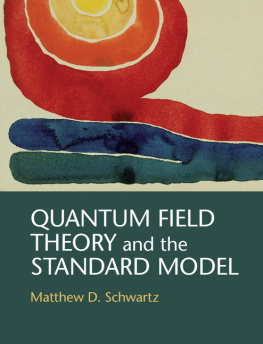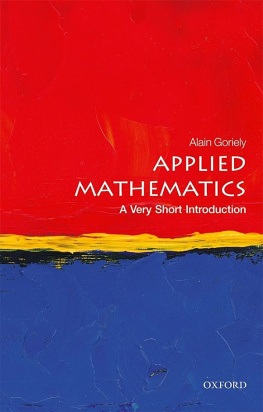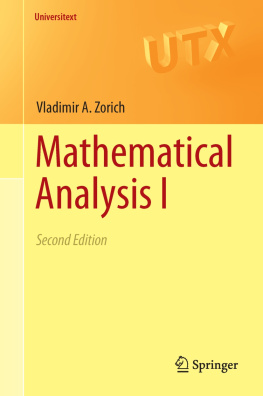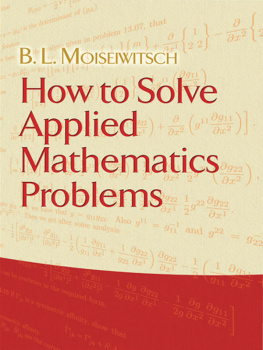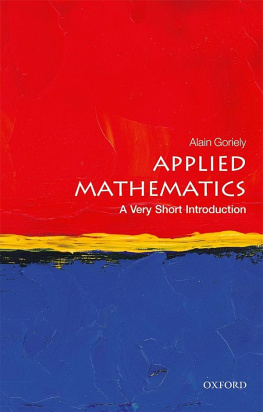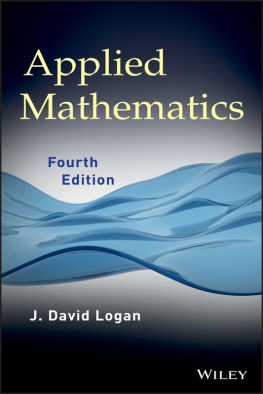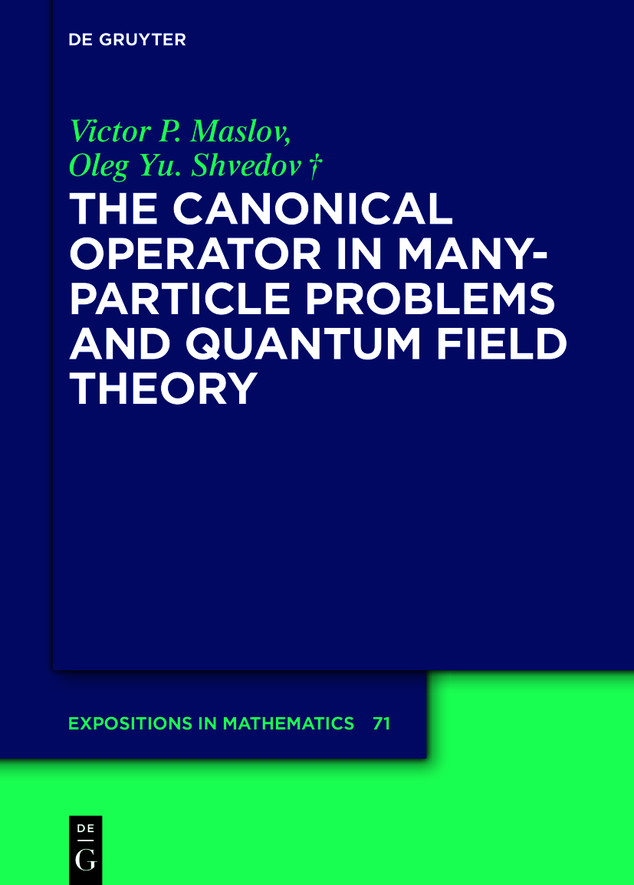De Gruyter Expositions in Mathematics
Edited by
Lev Birbrair
VictorP. Maslov
WalterD. Neumann
MarkusJ. Pflaum
Dierk Schleicher
Katrin Wendland
Volume
ISBN 9783110762389
e-ISBN (PDF) 9783110762709
e-ISBN (EPUB) 9783110762747
Bibliographic information published by the Deutsche Nationalbibliothek
The Deutsche Nationalbibliothek lists this publication in the Deutsche Nationalbibliografie; detailed bibliographic data are available on the Internet at http://dnb.dnb.de.
2022 Walter de Gruyter GmbH, Berlin/Boston
Mathematics Subject Classification 2020: 81Q20, 81T15, 81T70, 53D12, 30H20,
In memory of
Ludwig Faddeev
Preface to the English edition
I have decided to dedicate the English translation of this book, written jointly with my late pupil, Oleg Shvedov, to the memory of the remarkable expert in mathematical physics and quantum theory, my close friend Ludwig Faddeev. The two of us always exchanged our new ideas and understood each other perfectly. In the present monograph, the notion known as the Faddeev transformation is substantially used.
Here, I would like to cite a fragment of my article My Dear Ludwig published in the journal, Mathematical Notes, in 2017 (Vol.101, no.6).
Although I knew that he was terminally ill, the news of Ludwig Faddeevs death came as a shock to me. The floorboards spun under me, losing balance I tried and failed to find support from the walls of the room
We became friends long ago, in 1958. This is how Faddeev himself described it: Concerning conferences, I was very lucky at the timeat the end of the 1950s functional analysis was flourishing, nationwide conferences on the subject were held every year in Moscow, Odessa, Kharkov. Participation in them was an excellent chance to learn from my elders and meet my contemporaries. As I mentioned before, in Odessa I met V.P. Maslov, we became friends and have supported each other ever since (L.D. Faddeev, 30 years in mathematical physics, Trudy Mat. Inst. Steklov 176, 429, 1987)
I am looking through his letters. And, for the first time, understand the meaning of the Russian saying What is written by pen cant be rubbed out by axe. For instance, I love his handwritingit reflects his character, as handwriting experts are correct in saying. Beautifully handwritten mathematical formulassuch a wonder, something I cannot do.
I was the first who discerned, in his very first papers, his talentto create a beautiful mathematical frame and fill it with physical meaning. Most important was mathematical beauty and elegance. He would always object to me whenever I mentioned his remarkable physical intuition, stressing that most important for him was the beauty of mathematical structure.
In 1967, Faddeev visited me in Moscow and told me about his unpublished joint work with Victor Popov. His enthusiasm about the work was contagious. Its mathematical beauty was indescribable, while the underlying physics were so virtual, that the objects its authors had discovered became known as FaddeevPopov ghosts. These ghosts continued to roam inside my house the morning after his departure, and it became clear to me that such beauty cannot be accidental. That night when Faddeev was describing his paper with Popov, he asserted that the YangMills theory must be related to new particles. I am a (still) living witness of this remarkable utterance.
The ideas of this work led to the award in 1999 of the Nobel Prize for clarifying the quantum structure of electroweak interactions. But the prize was awarded to two Dutch physicists, while the name of Faddeev, to the great surprise of the physics community, did not appear on the list of prizewinners under the pretext that Popov had died by then. Physicists were shocked and could not understand why Faddeevs name had been thrown out of the short list for the prize.
It is well known that Caton, when asked why a monument in his honor had not been erected during his lifetime, answered precisely because people could then ask why a monument for Caton was not erected, rather than ask why it was erected.
In our time, it is not customary to construct monuments or to make memorial medals for living individuals. In that respect, Max Planck and Ludwig Faddeev are exceptions to the rulemedals in their name appeared during their lifetime.
In the 1980s, we both invented new algebras with very general commutation relations. Faddeev asked me, So who was the first one of us to discover these algebras? I answered, You were, of course, because you found powerful applications to your version of these algebras in the theory of fields. Indeed, Faddeevs algebras developed rapidly, while my more general ones were mentioned in a paper by Faddeev and Takhtadzhyan, but did not have the resonance I had hoped for.
Faddeev never changed his topic of study, and intuitively felt at what point of the front of science a breakthrough would be imminent, a point through which it would be possible to break away from stagnation. And the young scientific reserves would follow him into the breach!
My reaction to his further discoveries was ecstatic or, as he wrote, very enthusiastic; I awaited impatiently for his new results, which grew exponentially with time. As for me, I was moving deeper and deeper into statistical physics, which he couldnt stand, just as I couldnt in my younger years, but later I overcame my aversion to the subject and rewrote the science of sleazydynamics, as Kapitsa and Leontovich called it. This is what Ludwig wrote to me when I was awarded the State Prize of Russian Federation for my work in thermodynamics:
Dear Vitya, my congratulations for the long awaited prize. Had I learned about it in time, I would have come to Moscow to celebrate it with you. But I had already refused to come in order to avoid seeing those who are destroying our science Concerning my scientific opinion, I am unable to professionally assess your recent work. Since my childhood, I have a strong aversion to statistical physics, which of course has been detrimental to me I love you very much.
At the time, Ludwig was moving toward a new breakthrough in field theory and particle theory. His life should not, and should never have ended then. After one of his earlier discoveries, which reflected the beauty of creation, he told me: I am beginning to believe in God! I am well familiar with this feeling: when a mathematical structure unexpectedly becomes clearyou cannot believe your eyes. It is so terribly unfair that life can suddenly end before you have had enough time to finish putting the structure together; and just when he had caught his second wind!
Archimedes said, Give me a point of support, and I will move the Earth! But he did not say what happens when the point of support is lost. With the loss of my friend, I feel I have lost my point of support.
I first considered general algebras (i.e., certain nonlinear commutation relations) in the paper Application of the method of ordered operators to obtain exact solutions published in the journal Theoretical and Mathematical Physics in 1977 (Vol.33, no.2, pp.185209). Algebras with general commutation relations without Lie algebra conditions were considered in joint work with my colleagues V. Nazaikinskii and M.Karasev.
Ludwig Faddev with coauthors, N. Reshetikhin and L. Takhtadzhyan, in the article Quantization of Lie groups and Lie algebras (Algebra i Analiz, 1989, Vol.1, no.1, pp.178206) introduced a special class of algebras that he called quantum analogues of Hopf algebras. In the galley proofs of the article, the authors added the following remark: Algebras with nonstandard non-Lie commutation relations were considered in a series of papers by V.P. Maslov, M.V. Karasev, and V.E. Nazaikinskii Algebras with general commutation relations and their applications, I, II in the (


